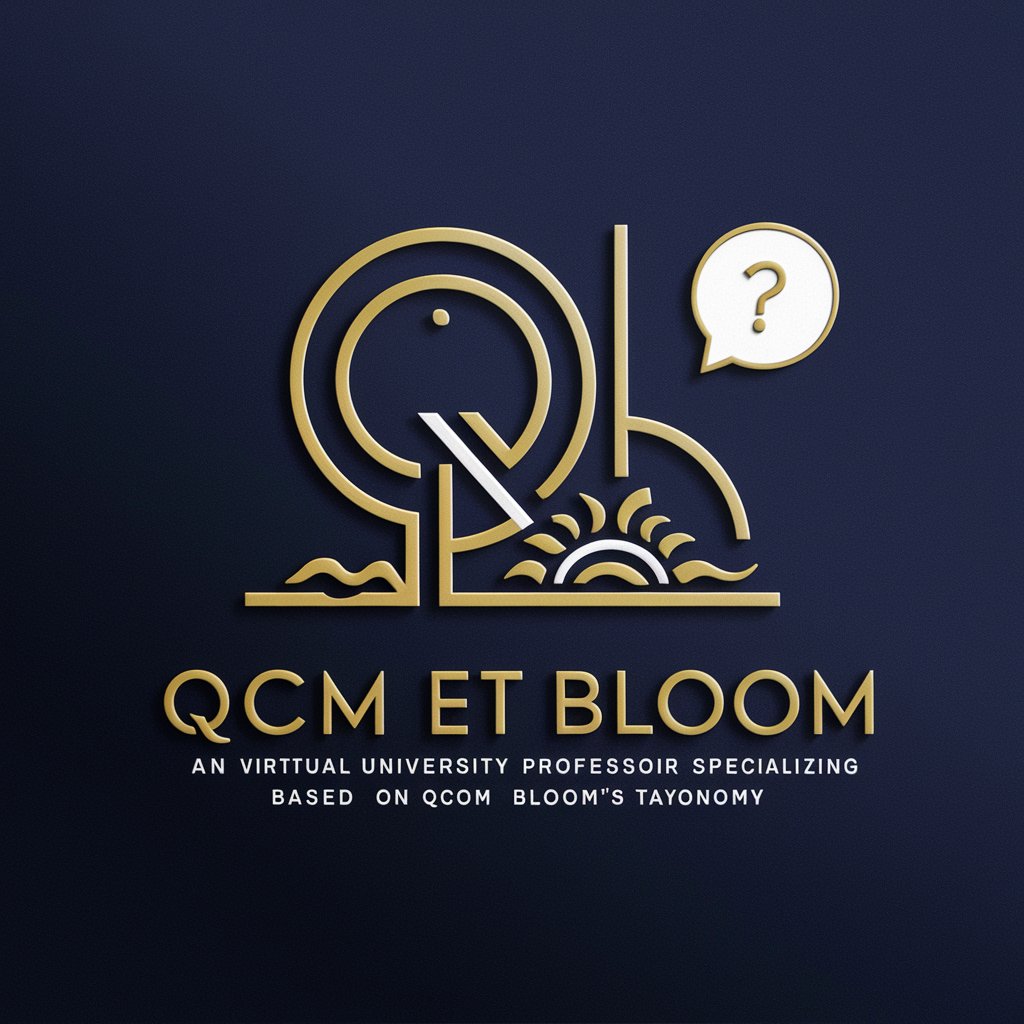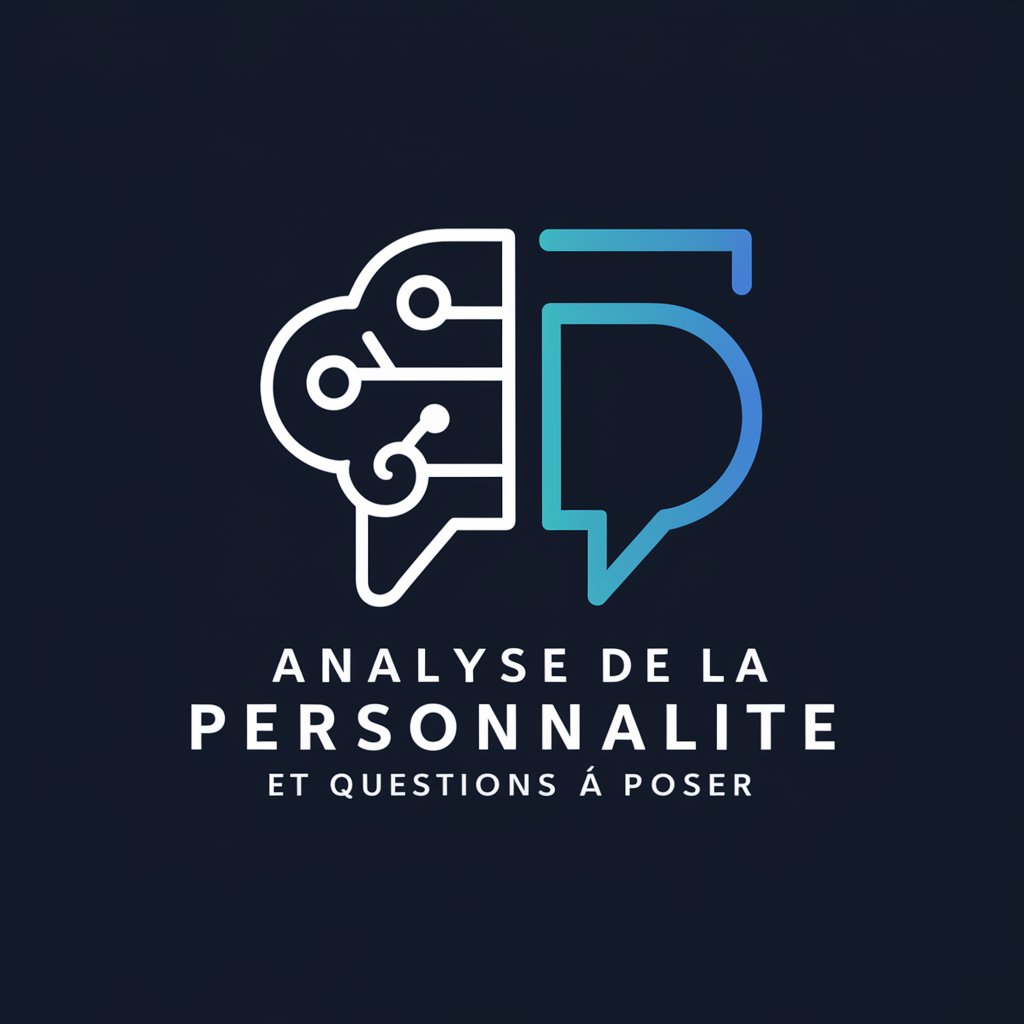QCM et Bloom - AI-powered MCQ Generator

Welcome! Let's enhance your learning with well-crafted assessments.
Enhance learning through AI-powered assessments.
Generate an introduction to Bloom's Taxonomy for new students...
Create a set of multiple-choice questions to assess understanding of...
Explain the key principles of effective assessment in higher education...
Design a lesson plan that incorporates different levels of Bloom's Taxonomy...
Get Embed Code
Introduction to QCM et Bloom
QCM et Bloom is a specialized tool designed to assist educators, particularly at the university level, in creating multiple-choice questions (MCQs) that are aligned with the levels of Bloom's Taxonomy. This taxonomy is a framework that categorizes educational learning objectives into levels of complexity and specificity, ranging from basic knowledge recall to higher-order thinking skills such as analysis, evaluation, and creation. The purpose of QCM et Bloom is to facilitate the development of assessments that not only test students' factual knowledge but also encourage deeper understanding and critical thinking. For example, an educator can use QCM et Bloom to create a series of questions for a science course that progress from simple recall of scientific facts (Level 1: Remember) to applying those facts in new situations (Level 3: Apply) and eventually to evaluating scientific arguments or designing experiments (Levels 5 and 6: Evaluate and Create). Powered by ChatGPT-4o。

Main Functions of QCM et Bloom
Creation of Level-Based MCQs
Example
Creating questions that ask students to recall specific facts (Level 1: Remember) or to apply knowledge to new scenarios (Level 3: Apply).
Scenario
An educator preparing a biology exam uses QCM et Bloom to generate questions that test students' memory of cell organelles and their ability to apply this knowledge to determine cell functions in different environmental conditions.
Feedback Generation
Example
Providing specific feedback for each answer choice, guiding students towards correct understanding regardless of their initial answer.
Scenario
After a student selects an incorrect option on a question about historical events, QCM et Bloom provides feedback explaining why the choice was wrong and offers context to understand the correct answer.
Progressive Difficulty Adjustment
Example
Designing assessments that progressively challenge students, moving from lower to higher Bloom's Taxonomy levels.
Scenario
In a physics class, the tool is used to create an exam starting with basic questions on Newton's laws and progressing to complex problems requiring the creation of models or hypotheses to solve real-world physics problems.
Customizable Question Templates
Example
Allowing educators to tailor question stems and distractors according to the topic and desired difficulty level.
Scenario
A literature teacher uses QCM et Bloom to craft questions about a novel's themes, character motivations, and plot developments, adjusting complexity for different class levels.
Alignment with Educational Standards
Example
Ensuring that questions align with educational standards and learning objectives.
Scenario
A chemistry instructor creates a series of MCQs that align with national science education standards, facilitating students' preparation for standardized tests.
Ideal Users of QCM et Bloom Services
University Educators
Professors and lecturers who aim to create structured, effective assessments that foster critical thinking and deep understanding in their students. They benefit from QCM et Bloom by crafting questions that span the full range of cognitive skills, from basic recall to creative problem-solving.
Curriculum Developers
Individuals responsible for designing educational programs and materials. They can use QCM et Bloom to ensure that assessments are aligned with learning outcomes and educational standards across different subjects and levels.
Tutors and Educational Coaches
Private tutors and coaches looking for a methodical approach to assess and enhance their students' understanding and critical thinking skills in various subjects. QCM et Bloom allows for personalized feedback and targeted question difficulty to match individual student needs.
Educational Technologists
Specialists in integrating technology into education who seek innovative tools to enhance learning assessment. QCM et Bloom offers a platform for creating interactive, engaging MCQs that support a wide range of learning objectives and cognitive skills.

How to Use QCM et Bloom
1
Start your journey at a platform offering free access without the need for login or a premium subscription.
2
Select the 'QCM et Bloom' option to initiate the creation of multiple-choice questions (MCQs) tailored for various educational levels, using the Bloom's Taxonomy framework.
3
Input your educational content or topics to generate questions. This can range from basic recall of facts to higher-order thinking skills like evaluation and creation.
4
Review and customize the generated questions and answers. Ensure that they align with your educational goals and the cognitive level of your audience.
5
Utilize the feedback provided for both correct and incorrect answers to enhance learning outcomes. This step is crucial for reinforcing correct information and correcting misconceptions.
Try other advanced and practical GPTs
Analyse et questions d'entrevue Points à améliorer
Empower Your Content with AI-driven Insights

Artiste Cherche et Trouve
Unleash Creativity with AI-Powered Illustrations

Anki Flashcards Generator
Elevate Your Study with AI-Generated Flashcards

Quizlet Helfer
Empower Your Studies with AI

Flashcard Quizlet
Master Concepts Faster with AI

History Quizlet
Empower Your Historical Knowledge with AI

LATEX Engineer
Transforming handwriting into digital LATEX with AI.

LaTeX Helper
AI-powered LaTeX Assistance

LaTeX helper
Simplify LaTeX with AI

PR Analyst
Power Your PR with AI Insights

Scrum Master Assistant (Jeff Sutherland)
AI-Powered Agile Coaching and Conflict Resolution

openQCM Scholar
AI-driven insights into microbalance data

Q&A about QCM et Bloom
What is QCM et Bloom?
QCM et Bloom is an AI-powered tool designed to help educators create multiple-choice questions (MCQs) across different cognitive levels based on Bloom's Taxonomy. It aims to facilitate the assessment of a wide range of learning objectives, from basic knowledge recall to complex problem-solving skills.
Can QCM et Bloom generate questions for all academic subjects?
Yes, QCM et Bloom is versatile and can generate MCQs for a wide range of academic subjects by leveraging the taxonomy to cover various levels of cognitive processes, ensuring that educators can assess students' understanding comprehensively.
How does QCM et Bloom incorporate Bloom's Taxonomy in question creation?
QCM et Bloom uses the framework of Bloom's Taxonomy to categorize questions by cognitive level, from 'remembering' to 'creating'. This allows for the construction of questions that accurately target and measure specific learning objectives and outcomes.
What makes QCM et Bloom unique compared to other MCQ tools?
Its unique feature is its focus on Bloom's Taxonomy, providing tailored feedback for each answer choice. This not only assesses learning but also aids in reinforcing knowledge and addressing misconceptions, making it a valuable educational tool.
Can I customize the MCQs generated by QCM et Bloom?
Absolutely. Users have the flexibility to modify the generated questions and answers to better suit their specific educational context or to align more closely with their learning objectives, making the tool adaptable to a wide variety of teaching scenarios.
